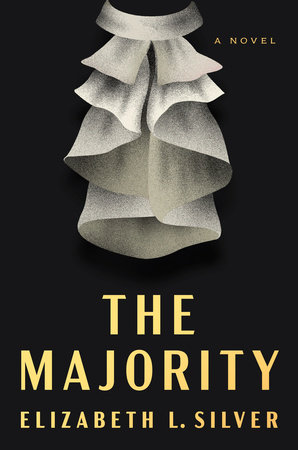The Majority Reader’s Guide
By Elizabeth L. Silver


1. The Majority is a novel about one woman’s journey to be a Supreme Court justice. It explores tensions between love and ambition, career and family, progress and patience. Which elements spoke to you most strongly?
2. As Sylvia Olin Bernstein tells the story of her life beyond her career, she offers an intimate account of her childhood in Brooklyn. How do her experiences as a child shape her beliefs about right and wrong? In what ways does the loss of her mother affect her path?
3. When Mariana, a Holocaust survivor, moves in with the Olins, Sylvia’s life is forever changed. How is Mariana’s influence on Sylvia different from that of her mother? How does Mariana’s experience affect Sylvia’s views? Sylvia says that she may never have been a Supreme Court justice if she hadn’t known Mariana—why do you think that is?
4. As a young girl, Sylvia stands up to a rabbi who is following traditional practices that Sylvia believes unfairly exclude women. Why do you think she feels comfortable challenging him? What does this show about her character and her early sense of justice?
5. After college, Sylvia becomes one of only nine women at Harvard Law School. There she meets James Macklowe, who teaches constitutional law and considers himself a champion of those nine women. The first epigraph of The Majority is a quote from the famous abolitionist and suffragist Sarah Grimké: “I ask no favor for my sex. All I ask of our brethren is that they take their feet off our necks.” Consider that quote in relation to James Macklowe. In what ways does he support women? In what ways does he hold them back?
6. During Sylvia’s internship with a public defender, she is held in contempt of court when she tries to give voice to a victim of domestic violence, a young mother named Amy McCartney. How does this act resound over the course of her career?
7. Joe Bernstein and Sylvia begin a relationship while they are both at Harvard, and Joe eventually becomes a devoted spouse and father. Do you think he helps Sylvia’s career or hinders it? What does he give up for her and vice versa? What does her ambivalence about motherhood tell us about the challenges she faces in terms of realizing her ambition?
8. Sylvia’s involvement in Alma Álvarez v. Finger Lakes Independent School District and the subsequent passage of the Pregnancy Discrimination Act shows that even when a justice holds a minority opinion on the court, that opinion can be used to help pass meaningful laws in the future. And, in various ways, most characters in the novel are dissenters who go against the tide. What do you think the novel is saying more broadly about the importance of dissent? What does it take to be effective at dissenting?
9. Discuss Sylvia and Aviva’s complicated relationship. Who turns away from whom, and why? What does their estrangement cost them, and what, finally, enables their reconciliation? What factors make it difficult for Sylvia to be completely honest with Aviva? Do you think Sylvia should have behaved differently regarding her daughter?
10. When Sylvia is a girl, her mother tells her to “change the system from the inside out if you want it to last.” How does this idea resonate with Sylvia over her many decades as a lawyer and then as a justice? Which characters challenge it?
11. Linda Loving is Sylvia’s close friend, but for decades there has been a secret between them. Why does Linda hide the truth from Sylvia? What do Linda and Sylvia’s relationship and their diverging careers show about the difference between how the world treats white and Black women? Do you think Sylvia is a good friend to Linda, despite her blind spots? How does Linda’s revelation complicate Sylvia’s ideas about what is possible?
12. Sylvia writes, “History is only as good as the historians, and I’m no longer trusting them to tell my story.” Why does she decide to tell her story near the end of her life? What does she think the public needs to know from outside the official record? What does she hope readers will take from her story?
13. Does The Majority make you think differently about the women and men who serve on the Supreme Court? How do you see the Supreme Court changing—if at all?
Just for joining you’ll get personalized recommendations on your dashboard daily and features only for members.
Find Out More Join Now Sign In